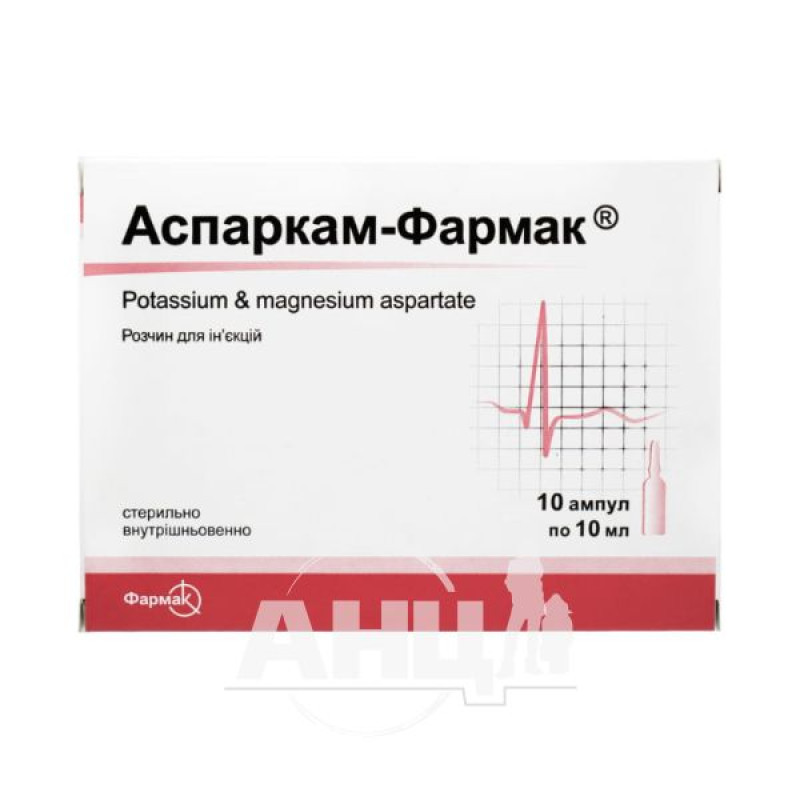Asparkam-Farmak solution for injection ampoule 10 ml No. 10

Pharmacological properties
Pharmacodynamics. The drug belongs to the group of drugs that regulate metabolic processes. Magnesium activates sodium-potassium ATPase, as a result of which the intracellular sodium content decreases and the influx of potassium into the cell increases. When the sodium concentration in the cell decreases, sodium-calcium metabolism in vascular smooth muscles is inhibited, which leads to their relaxation, potassium ions stimulate the synthesis of ATP, glycogen, proteins, acetylcholine; potassium and magnesium support the polarization of cell membranes. Asparaginate promotes the influx of ions into the cell and participates in energy metabolism. The antiarrhythmic effect is realized due to the ability of the drug to eliminate electrolyte imbalance, reduce myocardial excitability and conductivity.
Pharmacokinetics: Not studied.
Indication
For additional therapy in chronic heart diseases (heart failure, post-infarction period), in heart rhythm disorders, especially ventricular arrhythmias; additional therapy in treatment with digitalis preparations.
Application
The drug is intended for intravenous administration only. Adults: Asparkam-Farmak is administered slowly intravenously by drip of 10-20 ml (the contents of the ampoule are diluted in 50-100 ml of sterile 0.9% sodium chloride solution or 5% glucose solution). If necessary, the dose can be repeated after 4-6 hours. The drug is suitable for combination therapy. The course of treatment is determined by the doctor.
Contraindication
Hypersensitivity to the components of the drug; acute and chronic renal failure; Addison's disease; AV block of the 3rd degree; cardiogenic shock (BP 90 mm Hg).Side effects
With rapid intravenous administration of the drug, the possibility of symptoms of hyperkalemia, such as nausea, vomiting, diarrhea, paresthesias and / or hypermagnesemia (facial flushing, hyporeflexia, convulsions, feeling of heat, respiratory depression) should be taken into account.
Special instructions
Rapid administration may cause facial flushing.
With prolonged use of the drug, it is necessary to monitor the level of potassium and magnesium in the blood, and regular monitoring of electrolyte hemostasis indicators and ECG data is also required.
Asparkam-Farmak, as a drug containing potassium and magnesium, should be used with caution in patients with myasthenia gravis; in conditions that may lead to hyperkalemia, such as decreased kidney function, acute dehydration, the most common tissue damage, including severe burns. In this category of patients, it is recommended to regularly examine the level of electrolytes in the blood serum.
Since the drug contains sorbitol, patients with hereditary fructose intolerance should not use this drug.
Use during pregnancy and breastfeeding. To date, no danger has been reported when using the drug in this category of patients.
Children. Experience with the drug in children is insufficient, so it should not be used in this category of patients.
The ability to influence the reaction rate when driving vehicles or working with other mechanisms. The drug does not affect the ability to drive vehicles.
Interactions
With simultaneous use of the drug with potassium-sparing diuretics and/or ACE inhibitors, beta-blockers, cyclosporine, heparin, NSAIDs, the risk of developing hyperkalemia increases.
Overdose
Cases of overdose are unknown.
Given the ability of the kidneys to excrete large amounts of potassium from the body, increasing the dose of the drug can lead to hyperkalemia only if it is associated with an acute or severe violation of potassium excretion.
The therapeutic index of magnesium is wide, and in the absence of renal failure, severe side effects are extremely rare.
In case of rapid intravenous administration, symptoms of hyperkalemia/hypermagnesemia may occur.
Symptoms of hyperkalemia: general weakness, paresthesias, bradycardia, paralysis. Extremely high concentrations of potassium in the blood plasma can lead to death from cardiac depression, arrhythmia or cardiac arrest.
Symptoms of hypermagnesemia: nausea, vomiting, drowsiness, hypotension, bradycardia, weakness, slurred speech, double vision. At very high plasma concentrations of magnesium, hyporeflexia, muscle paralysis, respiratory arrest and cardiac arrest may develop.
In case of overdose, it is necessary to cancel K + -, Mg 2+ -aspartate and it is recommended to carry out symptomatic treatment (calcium chloride 100 mg/min i.v., dialysis, if necessary).
Storage conditions
In a place protected from light at a temperature of 15 to 25 °C.
There are no reviews for this product.
There are no reviews for this product, be the first to leave your review.
No questions about this product, be the first and ask your question.




